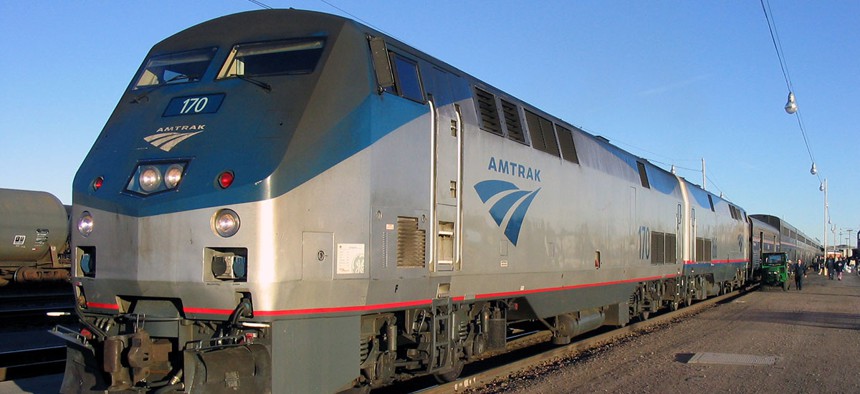
Jeff Williams/Shutterstock.com
What Transportation Officials Are Saying to Congress About Amtrak
At a House hearing Tuesday, railroad regulators described how a technology known as PTC would have prevented last month’s deadly train derailment.
Congress had its first opportunity to confront railroad officials about what happened the night of May 12, when an Amtrak train derailed, killing eight and injuring more than 200 people.
At a House Transportation and Infrastructure Committee hearing on Tuesday, members asked officials from Amtrak, the National Transportation Safety Board, and the Federal Railroad Administration about the decades-old technology officials say could've prevented the May accident, if only it had been implemented before the crash.
That technology, called positive train control, or PTC, is designed to prevent collisions between trains and mitigate speed-induced derailments.
"I still believe the single greatest contribution that my generation of railroaders can make to this industry is to implement PTC as rapidly as possible," said Amtrak president and CEO Joseph Boardman, his voice breaking. "And I promise you that by the end of this year this system, which will dramatically enhance safety, will be complete and operational on the NEC."
Boardman was citing the Dec. 31, 2015 deadline Congress gave several of the nation's rail operators to implement PTC. NTSB chair Christopher Hart said Tuesday that most won't comply with that deadline—Amtrak is virtually the only railroad that's slated to do so. Sarah Feinberg, acting administrator of the Federal Railroad Administration, cited lack of funding for its insufficient implementation, and said her agency has urged "year after year" for more funding from Congress so that commuter railroads and Amtrak could install it.
"Positive train control is the single most important technological development in more than a century, and it is absolutely necessary to ensuring the kind of safety that we expect on our rail system," Feinberg said.
Boardman said the technology would've been implemented sooner throughout Amtrak's rail lines if the company had more federal funds several years ago.
Rep. Sean Maloney, D-N.Y., said PTC technology could've prevented accidents on commuter rail lines like Metro North, where a 2013 derailment killed four people. In an exchange with Feinberg, he pointed the finger at Congress for insufficiently funding those commuter lines.
"Of all of the people who ought to be apologizing for these accidents that keep happening because we don't have the safety systems in place, the United States Congress maybe ought to be at the top of the list, wouldn't that be fair to say?" Maloney asked.
"I think that would be fair to say," Feinberg answered.
"And I think that when Mr. Boardfman comes in here, who's clearly heartsick over this episode and who is doing everything he can and is going to meet this deadline," Maloney said, "it might be nice if somebody on this committee expressed the heartfelt regret of the United States Congress for not having its act together in this area and so many others—where the safety of the American people is being compromised because we are dithering instead of investing in our own country. Isn't that fair to say?"
"Yes," Feinberg said.
Committee Ranking Member Peter DeFazio said that although insufficient funding can't be directly linked to the derailment, reducing Amtrak's budget jeopardizes operations and in the future could "even worse, cause an accident directly" due to old infrastructure.
"We can't ignore we're running trains over 100-year-old bridges of dubious stability," DeFazio said. "We can't ignore that we're running trains through 140-year-old tunnels that need total rehabilitation."
Dennis Pierce, president of the Brotherhood of Locomotive Engineers and Trainmen, said Amtrak can't continue to rely on the funding it's getting from Congress.
"What we spend on passenger rail is embarrassing," he said, compared with countries like China, France, the United Kingdom, Russia and Turkey. "We cannot expect Amtrak to run a first-class railroad if it's funded at third-world levels."
Amtrak's funding has been a contentious issue between congressional Democrats and Republicans for years now, with Democrats wanting more money appropriated to the rail line and Republicans' wary of how the company spends public money. After the May derailment, several Democrats blamed their Republican colleagues for the rail system's financial woes; Republicans shot back by saying Democrats were politicizing the accident.
A day after last month's derailment, a House committee voted to cut Amtrak's annual budget to $1.13 billion, from $1.4 billion. But as the debate continues in Washington—and as Amtrak continues to operate at a deficit—riders are seemingly undeterred from using the rail service: Last year, ridership on the Northeast Corridor, the nation's busiest, was at its highest level ever.
(Image via Jeff Williams/Shutterstock.com)







